
My experience working in various social movements as a Latinx queer professional has been enriched by finding a support system that is not always readily available for people whose intersectional identities do not mirror the norm. Over the past 15 years, I have worked with various nonprofits to provide services ranging from interpretation and translation assistance to engaging college students in the electoral process. Not surprisingly, several of these organizations had significant financial constraints that limited their ability to offer meaningful professional development opportunities for their staff.
I currently lead the voting rights organizing and campaigns for a community lawyering organization based in Durham, North Carolina. In my work, I collaborate with communities across the South to provide redistricting seminars to grasstops and grassroots leaders. The Community Redistricting Organizations Working for Democracy (CROWD) program encompasses a three-day comprehensive seminar and a fellowship to engage communities in the redistricting process. One of the aspects I most appreciate about the program is the iterative format of the fellowship. We have four cohorts that support fellows as they learn how to better network and support each other in the redistricting process. As we work to increase capacity and create sustainable growth in the various groups and organizations, we also strengthen and pivot our strategies and action plans to achieve our overarching vision.
As I reflect on the leadership observations of our organizing work, I see a clear connection between my experiences when it comes to having access to development programs that strengthened my professional growth and my ability to make a heightened and significant difference. In the interviews I conducted with a few colleagues and friends, the availability and flexibility of professional development funds reinforces the idea that they must be sound and iterative to meet the needs of queer Latinx employees.
I believe a work environment should incorporate an intersectional lens to fulfill an organization’s mission in both its work and how the group supports its staff. Foundations should support measures far beyond DEI (diversity, equity, inclusion) metrics, as they encourage nonprofit groups to incorporate a holistic approach that is both flexible and iterative.
Intersectional Approach
It seems just yesterday when I found myself in a job that I really loved. During my first couple of months on the job, it was everything I could have wanted: a flexible work environment, good benefits, friendly coworkers, and the ability to make a difference in the lives of young people. My honeymoon phase ended when I realized that the work felt like no more than a checklist of things to do for marginalized communities.
As the only Latinx staff member and one of just a few openly queer people on the team, I often felt invisible and struggled to find the support I needed to grow and be challenged. Many of my peers shared with me similar experiences at various points in their careers. They, too, felt their organizations fell short in offering adequate infrastructure and support to help cultivate staff leadership and professional growth for queer, racial, and ethnic minoritized communities.
Before any organization can attempt to address this issue, they need to create an environment where people with marginalized identities can thrive. There needs to be an antiracist and anti-oppression approach to the work and policies. And the organization’s practices must reflect these priorities. Having these policies in place means organizations can reexamine how their work centers people with marginalized identities and their experiences. Importantly, it validates minoritized communities and prevents organizations from treating people as disposable, unseen, or unknown.
When I worked at one large organization, I was the only full-time staff member of color. Although this scenario was a primary concern when I was interviewing for the position, I felt a sense of hope for a supportive work environment after learning that I would not be the only queer person. Nevertheless, I did not find the support I needed to excel. The team’s dynamics felt exclusive to their shared-life experiences as white, educated, and middle-class people. We need to encourage all team members to be their whole selves.
When people feel seen, understood, and validated, everyone wins.
Roxy, a gender-nonconforming Latinx person, sets an example of how employees can use professional development funds to foster an intersectional approach. In the weeks prior to Pride month, I asked them about their experiences with this topic.
In my current work setting, there are only a few people with my identities. As such, when I look for professional development opportunities, one of the things I prioritize is finding spaces for community support that can create interpersonal relationships leading to mentorship and can enhance part of my job responsibilities.
Roxy uses their professional development funds to attend conferences. And while some might attend conferences to enhance their skill sets, Roxy decides the conference they attend based on the likelihood they will create community with others. They are in the education field and use their funds to attend Creating Change, the largest LGBTQ activist conference in the United States. Roxy has worked in environments where they find themselves as the only person who holds their identities. For them, attending the Latinx Institute at Creating Change affords an opportunity to network with people, share information and resources, and make meaningful friendships with people whose identities mirror theirs.
Another event Roxy has participated in is ACPA, the American College Personnel Association, a college student educators’ annual conference, where they attend the Latinx Network Caucus. As with Creating Change, here they found support by building interpersonal relationships, primarily with other Latinx queer attendees. Roxy has found that the knowledge shared through storytelling among conference participants in both spaces is essential to their daily work. They navigate structural and interpersonal settings not conducive to their lived experiences.
Sign up for our free newsletters
Subscribe to NPQ's newsletters to have our top stories delivered directly to your inbox.
By signing up, you agree to our privacy policy and terms of use, and to receive messages from NPQ and our partners.
Beyond the One Question
Philanthropy can play a significant role in changing the narrative regarding professional development expectations. While some for-profit organizations have strong and focused professional development programs, this is generally atypical in the nonprofit sector. Most philanthropic organizations take it upon themselves to ask in their application materials and screening interviews about diversity and inclusion. Even so, this process of due diligence often neglects an opportunity to demonstrate support beyond checking a box to count towards a DEI metric.
While many organizations realize the value of workplace diversity, they often fail to fully examine their associated support systems to meet their staff’s needs. In the nonprofit sector, this can manifest in various ways. For example, some organizations do not have a sound commitment or focus to support minoritized communities in the workplace while others rely heavily on the person charged with equity and inclusion to carry on the torch of diversity. As a result, many BIPOC (black, indigenous, and other people of color) staff end up overlooked for leadership positions or scrutinized for failing due to inadequate resources or tools to succeed in the first place.
Additionally, according to the Attrition and Retention Consortium study, employers experience a higher quit rate of mid-level managers who are women and people of color. It is also important to point out that having a queer and/or person of color in a leadership position does not automatically guarantee an environment where other people of color peers can thrive. This assumption can tokenize the individual and be detrimental to an initiative or organization’s success.
There are many ways that foundations can step up to aid in enhancing an organization’s performance in this critical area. This includes allocating budget within grants that mandate paths for development and professional support practices for staff. For example, a nonprofit might fund project management training for staff members leading up to a critical event or campaign. By doing this, they work toward cultivating the range of skills needed to grow movement leaders that shape and transform communities. Employees should feel empowered to find the preferred training setting that works for them; for example, the community-focused approach and conference organizations that mirror their values, beliefs, and centers their identities and lived experiences.
All these tactics are a small step that would shift expectations and hold organizations accountable to align professional development with their mission.
Not a One-Size-Fits-All
Employers, especially nonprofits, should have an open and honest conversation with employees focused on achieving enhanced professional and career growth aligned with the organization’s mission. By taking a step back to authentically audit professional needs, employers increase morale and validate their colleagues’ life experiences. And because these life experiences might not fit into neat boxes, the resources and support offered should not either. While many organizations are diversifying their staff, they miss the opportunity to modify their infrastructure and relevant employee training programs and practices.
Roxy’s case sheds light on the value of attending conferences, while others might benefit from receiving training, seminars, or having leadership coaching. In my prior employment with North Carolina Campus Compact, I had five sessions a year with a professional coach. As a first-generation college graduate, I do not have access to as many professional mentors as my white counterparts might have. This means that I frequently have had to navigate work situations on my own. Having a different and nonjudgmental perspective was very helpful in my development and growth. As a direct result of that experience, I can now better advocate for what I want and need.
A Queer Latina who works in a grassroots immigrant rights organization in North Carolina shares a similar experience. Lupe, who consults with a trans Latinx coach from Training for Change, observes, “People think it is sexy to have a queer woman of color leading an organization and tell me to go to their various workshops; but, after I attend the sessions, I find myself wondering how to apply the skills learned in my own work, especially when the trainer does not fully understand my background.”
Instead of attending the go-to conferences, Lupe confided to me about how useful her coach has been since she started her new position as executive director. She engages with her coach in role-play exercises and practices different scenarios. One of the most valuable sessions occurred when she talked to her coach as if she were speaking with a founder. The experience taught Lupe not to compare herself to white executive directors when speaking to primarily white program officers in philanthropy.
Navigating power dynamics and self-advocacy are valuable skills that can enhance our ability to excel at our jobs. These real-life stories highlight the importance of tackling imposter syndrome, especially in work environments where the dominant culture favors white, patriarchal, and heteronormative norms. Our experiences with role-play scenarios start to address and unpack what we learned as professionals.
Moving Forward
Ultimately, there must be an ongoing dialogue to better understand the unmet professional and personal needs of our peers at every level of an organization. This dialogue between foundations and their nonprofit grantees will encourage proactive support and accountability to achieve the inclusive and just workplace we seek to create as we ultimately achieve the mission critical goals and vision for each organization.
My own story, along with those of Roxy and Lupe, highlights the need for solid and flexible professional development funding that focuses on the real-life experiences of people with similar life situations. Queer Latinxs should be able to select their preferred professional development programs to gain the skills they need to successfully navigate their work environments, as they work with and successfully support their nonprofit organizations.












